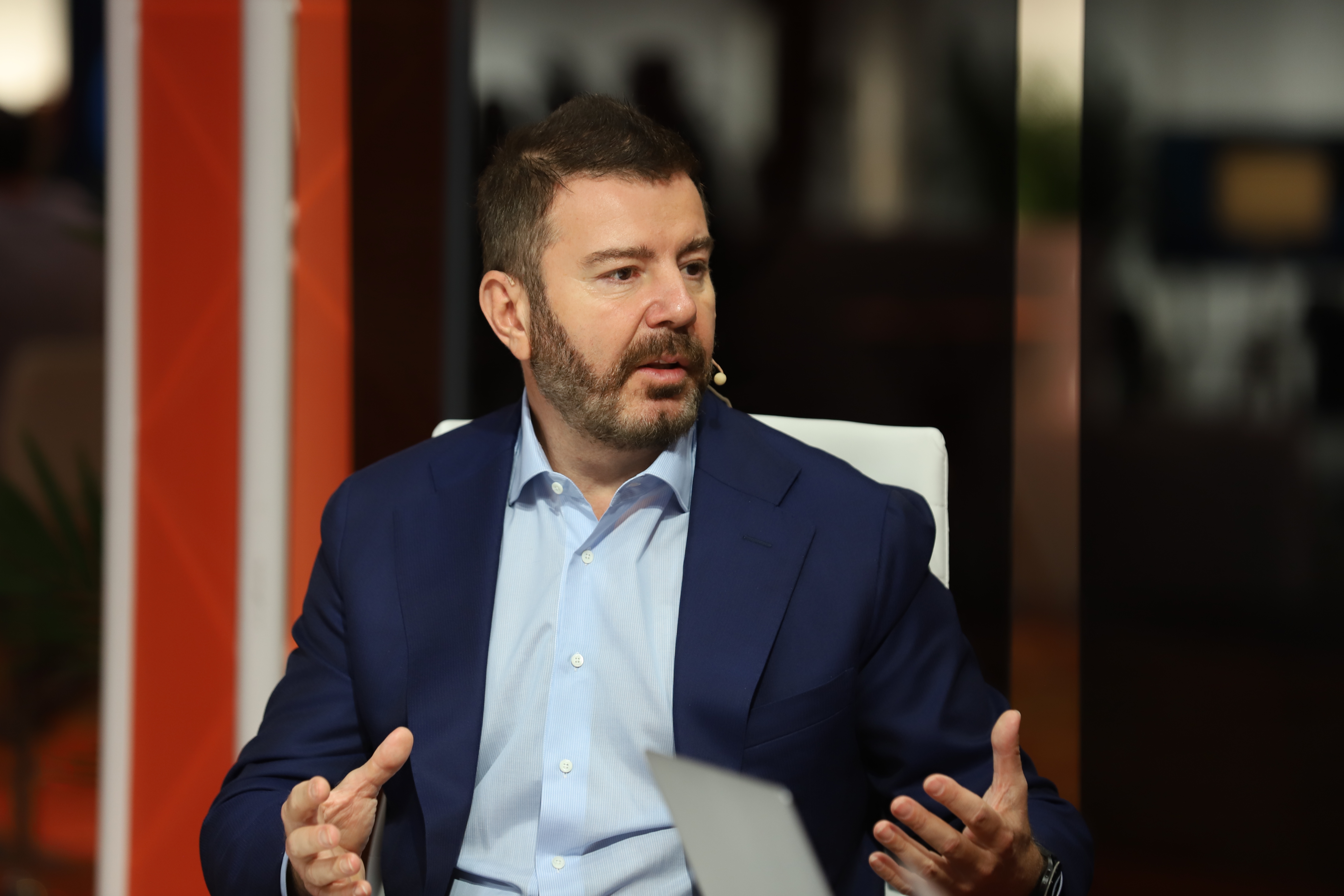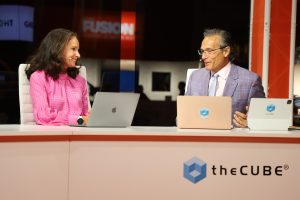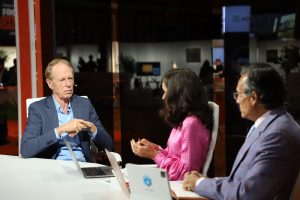 AI
AI
 AI
AI
 AI
AI
For businesses struggling to get their artificial intelligence projects into production, automation and orchestration could be the unifying forces that get them a return on their investment.
UiPath Inc., the automation business platform, describes its new orchestration suite as where “AI meets ROI.” In his keynote address at UiPath Fusion 2025, Daniel Dines, chief executive officer of UiPath, framed the company’s approach as a blend between robotic process automation and generative AI, according to theCUBE’s Dave Vellante (pictured, right).

TheCUBE’s Rebecca Knight and Dave Vellante discuss the keynote address.
“[Dines] talked about the deterministic nature of robots,” Vellante said. “He also talked about how RPA is hard when things change a lot. RPA is good at these kinds of sequential processes that are hardened. I think he’s saying we’re going to blend the deterministic pieces of RPA with the probabilistic pieces of gen AI. We’re going to, through our orchestration, both govern and create value.”
Vellante spoke with theCUBE’s host, Rebecca Knight (left), in a keynote analysis of UiPath Fusion 2025, during an exclusive broadcast on theCUBE, SiliconANGLE Media’s livestreaming studio. They discussed UiPath’s AI ambitions and its growing network of partnerships. (* Disclosure below.)
Here’s theCUBE’s complete UiPath Fusion 2025 keynote analysis with Rebecca Knight and Dave Vellante:
Here are three key insights you may have missed from UiPath Fusion 2025:
Following the initial wave of AI investments, the enterprise world is feeling the pressure to actually deliver value on their proof-of-concepts. The problem is not that companies are overestimating AI’s capabilities, but that they’re not being ambitious enough, according to Dines. The key to implementing AI is to restructure a business’s workflow with automation in mind.

UiPath’s Daniel Dines talks with theCUBE about the company’s AI ambitions.
“Our thesis is that you need to have a strong foundation of automation in order to bring intelligence into your processes,” Dines said during the event. “Many companies are stuck into building chatbots that have little impact on productivity. What we all know [is that] in order to reap the huge outcomes, you need to deliver as much [and] as autonomously as possible.”
Businesses should be using AI to tackle their most important, most energy-intensive processes, where any improvement will make a real difference to their organizations, Dines emphasizes. UiPath aims to facilitate this adoption process through its Maestro orchestration suite, a range of purpose-built agents and Unified Audit 2.0, a centralized platform for ingesting automation, agent and governance logs into enterprise compliance systems.
“Pick something that is important for your organization and in case you are successful, will rally people behind you,” Dines advised. “We are into an early adopter’s industry. I don’t think there are no blueprints of large-scale implementations. We are building them right now. It’s a process that really helps with the adoption.”
Here’s theCUBE’s complete video interview with Daniel Dines:
UiPath Maestro offers prebuilt orchestration templates for high-volume processes such as claims and loans. The release is paired with Maestro Process Apps, which gives users real-time visibility into their companies’ workflows, according to Graham Sheldon, chief product officer of UiPath.

UiPath’s Graham Sheldon talks with theCUBE about the power of orchestration.
“Maestro is like a control plane … for doing this orchestration end-to-end,” he said during the event. “What we do … is provide Maestro as a way to sort of model what that end-to-end process looks like to be able to automate specific pieces of it, either with robots, for that deterministic work, or agents for the non-deterministic work and human in the loop for when people need to make those final decisions.”
As part of its orchestration strategy, UiPath partners with other AI companies, such as LlamaIndex Inc., which started out connecting AI models with proprietary data and now acts as a connector in the enterprise data ecosystem. UiPath’s automation platform supports LlamaIndex’s framework, among others, as part of its expanded development environment.
“There’s still a clear need for agents to connect to the right set of tools to actually load in the relevant context,” Jerry Liu, co-founder and chief executive officer of LlamaIndex, told theCUBE. “There’s a real question of how do you actually inject the right context into these models so that users can get value out of it? The core need for every enterprise today is not to just depend on the raw reasoning capabilities of these models, but to use it with their own data.”
With the rise of “vibe coding,” or coding using AI, governance is more important than ever. UiPath’s platform brings in a deterministic layer that can keep AI agents in check and prevent them from accessing protected data. Unified Audit 2.0 includes features that extend agent guardrails and real-time content moderation, according to Taqi Jaffri, senior director of product management at UiPath.
“People think orchestration is just stitching together different systems and calling it a day,” he said during the event. “It’s not. We use a lot of underlying tech to make all that seamless to the developer and that, to me, is the heart of orchestration. We want to make it simple to the developer.”
Here’s theCUBE’s complete interview with Graham Sheldon:
Though companies might be tempted to graft AI onto existing workflows, the better strategy is to start reexamining their business processes now, according to Erik Brynjolfsson, Jerry Yang and Akiko Yamazaki professor at Stanford University; senior fellow at the Stanford Institute for Human-Centered AI; and director of the Stanford Digital Economy Lab. Once those companies figure out where AI can actually provide value, then they can start to see a return on their investment.
“The thing I’ve been focused on all my life, and I kind of feel like now more than ever, is understanding how you can take these amazing technologies and turn them into business value,” Brynjolfsson told theCUBE. “We’ve got to convert that into something that’s useful for businesses, useful for consumers, and unfortunately, that’s just not happening as fast as it could be.”

Forrester Research’s Craig Le Clair talks with theCUBE about ethical adoption of AI.
Another component of AI adoption is the employees who will actually be using it. Amid rising concerns that AI will replace jobs, experts such as Craig Le Clair, vice president and principal analyst at Forrester Research Inc., are examining how humans can respond to the wave of nonhuman entities.
“We’re just driving people off a cliff by just pushing automation at them,” he said during the event. “You just watch the 80-year-old woman trying to read the four-point font on the avocado to scan it at the kiosk. There are many examples where we’re taking humans out of the process too rapidly, and that’s something that was not predicted.”
Le Clair’s goal is to foster worker agency by giving them skills for the digital era and incorporating empathy into the hiring process. Device skills and physical environment expertise could potentially help workers move into new roles in the AI economy.
“If you’re working at McDonald’s or in retail food, get out of it, but use your device skills,” Le Clair told theCUBE. “The average high school graduate has device skills that give them many, many jobs, manipulating flat screens and warehouses, actually maintaining physical robotics in these physical environment places.”
Here’s theCUBE’s complete interview with Erik Brynjolfsson:
To watch more of theCUBE’s coverage of UiPath Fusion 2025, here’s our complete event video playlist:
(* Disclosure: TheCUBE is a paid media partner for UiPath Fusion. Neither UiPath, the sponsor of theCUBE’s event coverage, nor other sponsors have editorial control over content on theCUBE or SiliconANGLE.)
Support our mission to keep content open and free by engaging with theCUBE community. Join theCUBE’s Alumni Trust Network, where technology leaders connect, share intelligence and create opportunities.
Founded by tech visionaries John Furrier and Dave Vellante, SiliconANGLE Media has built a dynamic ecosystem of industry-leading digital media brands that reach 15+ million elite tech professionals. Our new proprietary theCUBE AI Video Cloud is breaking ground in audience interaction, leveraging theCUBEai.com neural network to help technology companies make data-driven decisions and stay at the forefront of industry conversations.